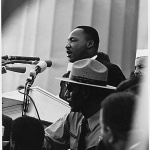I love being Black. I love the way our skin tells our history. I love our collective struggle and endurance. I love the art that is produced from our pain, the reclamation or recreation of culture, the continual fight for recognition and freedom. I have never been more proud to be in community, to be conscious, informed, and a fighter for equity and justice than I am at this moment.
This is an interesting time in our country to think about blackness—what it means to be Black in the United States, what it means to strive for full recognition of our humanity, and to truly see a socially just society. As many of us are deeply engaged in the #blacklivesmatter movement, there is a sharp divide between those who understand and are conscious of the systemic issues we fight and those who honestly don’t know and don’t have to know because it does not directly affect their lives. As we approach our annual celebration of the birth of Dr. Martin Luther King Jr., let’s refocus on the American dream and how we can make that attainable for ALL people. As I think about what MLK’s dream means for me as a young Black woman in America, I take into account the amazing opportunities that I’ve had as well as the continual challenges I face with racism and sexism in my personal interactions and on an institutional level.
Like MLK, I consider myself an optimist, hoping and knowing that we can all do better to accomplish the dreams of our founding fathers—a land of free and brave (wo)men and a land where all (wo)men are created equal. Even though our nation’s history states otherwise, our future can be one that fully realizes these dreams. While many of the stories we received as children about Martin Luther King Jr. were accurate, often they were not complete. MLK was not perfect, nor was he alone in his fight for equity and freedom. There are countless faces and names that we do not know. Those who marched, were arrested, or participated in sit-ins; they are invisible in our history books.
As we remember Dr. King’s legacy, we must also hold dear the many others who stood alongside him. As a young Black woman participating in the Black Lives Matter movement, I see how our faces, names, and stories get erased much like the women who were leaders in the Civil Rights movement. I honor Dr. King for his voice and leadership while simultaneously remembering that he was not the only one, that he was surrounded by freedom fighters who risked their lives daily so that I might see my humanity fully recognized.
As the new film “Selma” hits theaters across the nation, Dr. King’s story is front and center again, as we are reminded of how far we have come. We see more participants, more faces, more men and women, children and leaders. We see their struggle and remember what we continue to fight for today. Throughout my journey as a Black woman in American, I will continue to think about those who came before me, the people who thought of my existence even before I had my first breath, and the many people who wanted to create a world for me better than the one they had. I am constantly reinvigorated by the tenacious spirit of my ancestors and further motivated by the dream of a world I hope to leave for my children. Collectively, we can change the world. We must not shut our eyes. We cannot turn away. We are in the midst of a modern civil rights movement. What side of history will you be on?
In the spirit of Dr. King, I would like to leave you with a challenge—a challenge to think beyond peace and to consider what equity and justice really look like.
Bu






